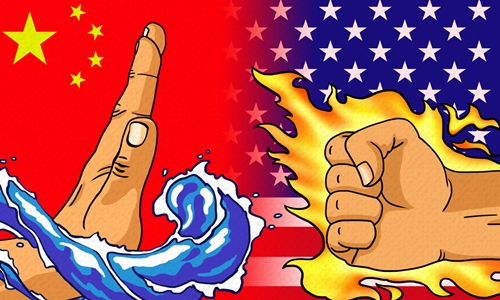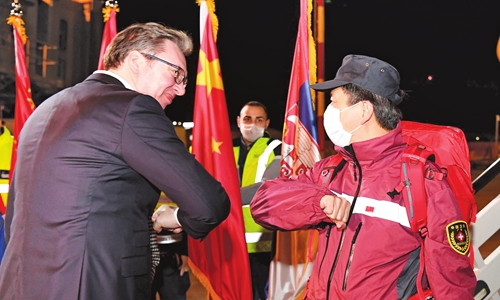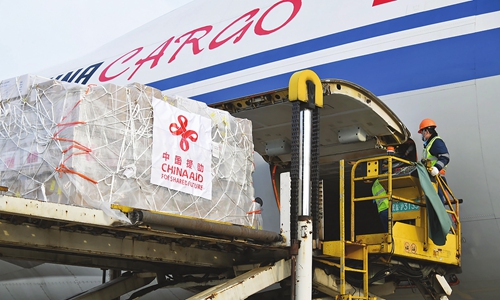HOME >> CHINA
China has no intention to take over US role
By Li Aixin Source:Global Times Published: 2020/4/7 13:33:40 Last Updated: 2020/4/7 23:33:40
Perceptions are changing among countries over who is leading the world

China VS US
As the US pandemic response falters in the face of mounting coronavirus infection cases while China lends a helping hand to countries struggling with COVID-19 after having seen a dramatic slowdown in its own rate of new infections, anxiety over Beijing "exploiting" the health crisis overtaking Washington and "global hegemony" theories are rising in the West.
Leading the world in a US hegemonic way was not in China's playbook, Chinese observers said, but added if "global leadership" meant promoting cooperation and providing global public goods, then China was indeed pursuing this type of leadership.
Over the past few days, some Western experts and media outlets, especially those from the US, have been suggesting that the worldwide public health crisis was the "opportunity of the century" for China to cement its place as a global power.
An article in US magazine National Review said Friday, "China wants to use the coronavirus to take over the world."
The view was echoed by Singapore-based news channel Channel NewsAsia, which commented Monday "China has kept its eye on the prize of displacing the US as the go-to major power in global crises."
Even Henry Kissinger, former assistant for national security affairs and US secretary of state, published an article on Friday headlined "The coronavirus pandemic will forever alter the world order" in The Wall Street Journal.
Some Chinese analysts said Kissinger was more or less hinting the US should be careful not to hand global leadership to China on a silver platter.
Brazilian education minister Abraham Weintraub put it more directly by tweeting that the pandemic would help China "dominate the world," which he later deleted on Sunday. The Chinese Embassy in Brazil called Weinraub's claim "absurd."
The fact that global leadership was slipping from Washington's grip has been acknowledged by experts for quite some time, since the US itself and its allies' expectations of and confidence in the country have been declining, Chinese experts said.
The pandemic was accelerating the process, they asserted, but added that this was not the moment for China to claim global leadership.

An handout picture taken and released by the Serbia's presidential press office on March 21 shows Serbian President Aleksandar Vucic (left) welcoming a group of Chinese doctors at Belgrade's airport. Photo: AFP
Sharp contrast
"We have it under control. It's going to be just fine," was how US President Donald Trump described the situation on January 22, two days after China confirmed human-to-human transmission of COVID-19.
Since then until early March, Trump reiterated the situation was "well under control" and he was "not concerned."
On March 26, the US overtook China to become the country with the largest number of confirmed COVID-19 cases in the world, with 81,943 people testing positive for COVID-19, compared to 81,285 cases in China reported the same day.
Since then, a growing anxiety has been detected in US reports and commentaries including "Will our democracy still work with coronavirus?" published on March 26 in The Washington Post, and "The Virus Comes for Democracy," published on April 2 in The New York Times.
The US will witness its coronavirus "Pearl Harbor" moment and a 9/11 moment in the coming week, US Surgeon General Jerome Adams said on Sunday.
As of press time, the US had reported 366,614 cases, and 10,783 deaths, according to data from Johns Hopkins Coronavirus Resource Center.
Chinese experts said that looking at how the US has been coping with COVID-19, it was not hard to see why the crisis came to this point in the country.
Even if the country had seen what happened in China, the observers said, especially the lockdown of Wuhan, the loudest possible alarm bell China could possibly have rung to alert the world, top US officials still spent weeks downplaying the threat of the virus.
Without focusing on preventing transmissions among communities, preparing enough medical supplies or making unified and nationwide plans, and with constant wars of words over budgets and each state fighting its own coronavirus battle, the epidemic swept across the country, with densely populated areas such as Detroit and New Orleans likely becoming the epicenter to follow New York.
Americans are not satisfied with the way Washington is handling the pandemic, Wu Xinbo, dean of the Institute of International Studies at Fudan University, told Global Times on Monday.
They also see the US as being selfish for not only being hesitant in providing help to other countries, but also scooping up medical supplies worldwide, Wu said.
Andreas Geisel, the interior minister for Germany's Berlin state, accused the US of piracy on Friday after Washington reportedly diverted a shipment of masks intended for Germany and outbid other countries for critical medical supplies.
The White House ordered Minnesota mask manufacturer 3M on Thursday to prioritize US orders and stop exporting masks to Canada and Latin America.
Dwight Ball, premier of Newfoundland, Canada, made no secret of his frustration over the US banning vital medical supplies to his country by underscoring that "in times of crisis you don't stop being human."
A contrast can be discovered in China's approach. Not only has China brought the epidemic under control, it has also been proactively promoting international collaboration, offering medical supplies and advice to countries worldwide, as well as dispatching medical expert teams to badly hit regions.
China made a $20 million donation to the World Health Organization in March. Just over past few days, China has donated 2 million surgical masks, 200,000 N95 masks and 50,000 test kits to Italy and 1,000 ventilators to New York, according to Xinhua News Agency.
China's response to the initial outbreak was not desirable, said Odd Arne Westad, a professor at Yale University and an expert on the history of the Cold War. But China "mobilized its resources better than what most Western countries have done," he said.
Assistance to others will invariably raise China's international prestige, Westad noted.
Yet some US media were quick to seek new angles for smearing China, like Foreign Policy magazine, which suggested China was seeking global hegemony based on sponsoring economic reconstruction like the US did after World War II, in an article headlined "China's Coronavirus Debt Traps Are Coming."
By giving help, China was simply being responsible as a major power in assisting those in need, rather than seeking to replace the US in the current world order, Chinese observers replied.
Unfortunately, the move was being misinterpreted by some media outlets and politicians with a hegemonic mentality. They warned that Beijing was striving for geopolitical influence.

Staff transport medical supplies to a cargo plane on Sunday. Photo: cnsphoto
Attacks stem from anxiety
Doubts in the US political system are rising among Americans, said Chinese experts. "When the COVID-19 pandemic is over, many countries' institutions will be perceived as having failed," wrote Kissinger.
US political scientist Francis Fukuyama wrote in The Atlantic on March 30 that "the major dividing line in effective crisis response will not place autocracies on one side and democracies on the other."
The crucial determinant in performance would not be the type of regime, but the state's capacity and trust in government, Fukuyama said.
Chinese experts declared that the pandemic has triggered a debate some Western elites never wanted: Which system is better at handling a crisis, or simply, which system is more efficient or reliable?
This anxiety provoked smears against China, they said, in an attempt to prove Western superiorities.
"I believe that all of China's actions since it succeeded in overcoming the coronavirus have been motivated by the hope of saving lives," William Jones, Washington bureau chief of Virginia-based weekly news magazine Executive Intelligence Review, told the Global Times.
He noted that the idea China was trying to become a global hegemon was a myth, promoted by people who insist that the Atlanticist clique, which has governed the world for the last 50 years, must be the sole "rule maker."
That view was echoed by Xin Qiang, deputy director of the Center for American Studies at Fudan University in Shanghai, who said some US elites tend to believe China will utilize every opportunity possible to overturn the international order and US hegemony in an attempt to become the No.1 power in the world, since the logic of "a strong power is bound to seek hegemony" is deeply rooted in their mind-set.
This mind-set has been in existence long before the novel coronavirus outbreak, and will last long after, Xin suggested.
The comprehensive US containment of China over the past years was the proof of this mentality, Chinese experts said.
After witnessing China's efficient response to the coronavirus epidemic and US' incompetence, they pointed out that suspicion and anxiety will only be exacerbated.
Western accusations against the Chinese system have been constantly changing with the development of the pandemic.
In the early stages of the outbreak in China, the West accused Beijing of violating human rights for putting Wuhan under lockdown.
Now that the city's outbound and inbound transport have resumed, New York has gone into a coronavirus lockdown, with some Chinese internet users saying the US has finally realized that "quarantine, no human rights, no quarantine, no human left."
Measures do not depend on political ideology, but on whether a country genuinely yearns to bring the crisis under control, Xin said.
Since the earlier attacks on China were gradually losing their attraction, the focus of the US blame game has changed.
In addition to asserting that China was seeking global leadership, the US has unceasingly cast doubt on China's reported coronavirus-related figures.
After WHO confirmed that the data the organization received was based on scientific proof, the US accused the WHO of corruption baselessly.
As China steps up to deliver public goods while the US is busy finding ways to criticize China for the alleged spread of the virus, countries are becoming increasingly aware that Washington is not helping at a time when help and solidarity are needed the most.
"Here in Italy it is going to change for good the perception of who is leading in the world, and it's not the US," The Washington Post quoted Nathalie Tocci, head of the Italian Institute of International Affairs, as saying.
World leadership
A number of observers believe the international community is confronting its greatest challenge since the end of World War II, without US leadership.
Chinese experts noted that while China should contribute more within its capabilities, it was not time for the country to overtake the US and steer the global ship.
However, there are many ways to define "global leadership," said Wu. "If it is about proposing initiatives, setting agendas and rules, promoting relevant actions in joint efforts and providing global public goods," then China was pursuing this type of leadership.
Chinese observers assert that China's approach is about saving lives and making the world more secure.
But if it was about striving in the geopolitical sphere, seeking hegemony with the mentality that only one country can make the rules, China has neither the ability nor the will, they said.
It was "ridiculous" to talk about a potential change in the world order, they said, as China was slowly recovering from the tragic damage caused by the virus epidemic.
It's time for stronger international cooperation to end this nightmare, George N. Tzogopoulos, director of EU-China Programmes at the France-based Centre International de Formation Européenne, told the Global Times.
"The providing of assistance by China is appreciated by people in need in all countries. And this is what matters," he said.
Posted in: DIPLOMACY